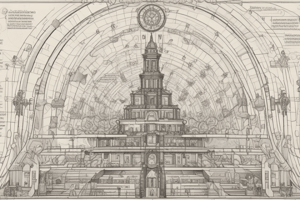Podcast
Questions and Answers
What are the disadvantages of a hierarchical structure?
What are the disadvantages of a hierarchical structure?
Slow decision-making process, lack of flexibility, low morale, and limited employee involvement.
What is a functional structure in an organization?
What is a functional structure in an organization?
When departments or functions have separate heads and report directly to the highest level of the company.
What are the advantages of a functional structure?
What are the advantages of a functional structure?
Efficient utilization of resources, strong departmental cooperation, and increased efficiency.
What are the advantages of a networked organizational structure?
What are the advantages of a networked organizational structure?
What are the disadvantages of a networked organizational structure?
What are the disadvantages of a networked organizational structure?
How does organizational structure impact organizational behavior?
How does organizational structure impact organizational behavior?
What are some factors affecting the labor market?
What are some factors affecting the labor market?
Why is it important for businesses to understand factors affecting the labor market?
Why is it important for businesses to understand factors affecting the labor market?
Flashcards are hidden until you start studying
Study Notes
Organizational structures refer to the formal frameworks defining how people within an organization interact with each other and their respective roles in achieving its goals. There are various types of organizational structures such as:
-
Hierarchical Structure: This is a traditional management model where several levels of managers oversee employees, making decisions from top to bottom.
- Advantages: Clear chain of command, effective control, and clear division of responsibilities.
- Disadvantages: Slow decision-making process, lack of flexibility, low morale, and limited employee involvement.
-
Functional Structure: In this type of organizational structure, departments or functions have separate heads and report directly to the highest level of the company.
- Advantages: Efficient utilization of resources, strong departmental cooperation, and increased efficiency.
- Disadvantages: Lack of coordination, communication problems, and poor integration.
-
Matrix Structure: Also known as matrix management, it combines functional and hierarchical structures by allowing employees to work simultaneously across multiple projects and teams.
- Advantages: Flexible working arrangements, ability to share expertise, and improved communication between teams.
- Disadvantages: Complexity, potential confusion regarding authority and accountability, and increased complexity in managing human resources.
-
Networked Structure: Characterized by horizontal rather than vertical relationships, this structure emphasizes decentralization and self-directed teams.
- Advantages: Greater autonomy, enhanced innovation, and improved problem-solving abilities.
- Disadvantages: Potential misalignment of strategic directions among network members, diffused responsibility, and reduced overall control.
Organizational structure accounts for a significant portion of organizational behavior. It influences the culture, climate, and performance of organizations as well as the behavior of individual employees.
The factors affecting the labor market are numerous and complex, including:
-
Economic Conditions: Gross Domestic Product (GDP), inflation rates, and interest rates can impact job opportunities and wages.
-
Technological Changes: Automation, artificial intelligence, and new technologies can change the nature of jobs and affect employment in specific industries.
-
Demographic Shifts: Population growth, aging, and migration patterns influence the supply and demand for certain occupations.
-
Government Policies: Regulations related to immigration, education, and industry continue to shape the labor market landscape.
Understanding these aspects helps businesses make informed decisions regarding hiring, retention, and training policies.
Studying That Suits You
Use AI to generate personalized quizzes and flashcards to suit your learning preferences.




